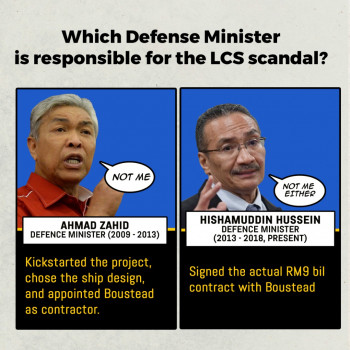 As a child, I used to look up to those with titles in front of their names.“Yang Berhormat, Dato’, Tan Sri.” I did not know their exact meanings, but it made them sound important. This impression was enhanced when I realized that adults spoke to them with a respectful, even fearful tone. On my first day of work with my current boss, a Member of Parliament, I felt so nervous, as if I was about to meet a supernatural being.
As a child, I used to look up to those with titles in front of their names.“Yang Berhormat, Dato’, Tan Sri.” I did not know their exact meanings, but it made them sound important. This impression was enhanced when I realized that adults spoke to them with a respectful, even fearful tone. On my first day of work with my current boss, a Member of Parliament, I felt so nervous, as if I was about to meet a supernatural being.
After growing up, I learnt that ‘Yang Berhormat’ (YB) is a title reserved for elected representatives. Im intrigued how a person can earn the title overnight, simply by scoring more ballots than their competitors in an election. These are often fierce contests; a slight change on voting patterns could be crucial to the final result. Yet, a victory at the ballot box, however narrow it is, instantly transforms a person – who before the election does whatever it takes to woo voters –into an ‘honourable’ person. Were they less honourable before they were called so? Or does it mean that the party who lost is less honourable?
Unlike doctors, engineers or architects who earn their titles through education; politicians earn theirs by convincing voters that they are the best candidate to carry out the job. They do not pass exams for this; the title is given before they prove themselves worthy of it. In other words, the voters are taking a bet on them. Winning the trust of the people earns them titles, but whether they live up to it remains to be seen in the days to come.
Titles do not an honourable person make. Exaltations are given to elected representatives not because of what they deserve, but because of what is expected of them. The question then is, what should be expected of the YBs?
In a 1979 study by Musolf and Springer, 29.2 percent of the Malaysian MPs interviewed felt that ‘resolving local conflicts’ is the single greatest expenditure of their time, while 20 percent spent most of their time ‘dealing with civil agency on behalf of constituents’. Only 6.3 percent spent most of their time debating and amending bills. Clearly, activities to meet specific needs of constituents took centrestage, while their legislative roles as parliamentarians were diminished.
Thirty years on, not much has changed. MPs are still preoccupied on the grassroots level, attending social function after social function – it is not uncommon to see them at five events on the same night during festive seasons. Even when Parliament sits, most MPs invariably shuttle from capital to constituency to juggle multiple duties.
In a recent survey by Merdeka Centre, 29 percent of the participants felt that the main responsibility of an MP is to attend to local issues such as drainage issues. This sentiment was especially prevalent among the Indians (41 percent).
In theory, Malaysia’s three-tiered government system places local issues under the local government. Unfortunately, most voters do not know how to differential between the roles of the federal, state, and local governments as stated in the Constitution.
Potholes, clogged drains, falling trees, and other related issues are the duty of the local council. Welfare aid and scholarship applications could just as well be conducted directly without elected representatives’ ‘recommendations’. Squatters’ issues (in which MPs are often asked to step in) could be easier resolved with legal reform. The bottom line is, many of the complaints brought to MPs service centres could be solved at the local government level, aided by a competant and efficient civil service.
In many ways, Malaysian MPs have inherited the role of traditional authority-figure in a kampong, where the village head is the go-to person for all things big and small. Today, a wakil rakyat also acts as welfare officer, land officer, family counsellor, and everything else in between.
In some cases, citizens expect their MPs to contribute to local infrastructure. But many are not aware of the lopsided distribution of parliamentary constituency allocations. Only MPs from Barisan National receive this allocation, which should rightfully be given to all parliamentarians equally regardless of partisanship. Opposition MPs are forced to operate solely from their personal salary or from funds raised on personal initiative.
Indeed, a personal touch does garner publicity and political mileage. But what exactly did we elect our elected representative for? Although our vote gave them their jobs, it is not their job to fulfil our demands. They represent the aspirations of our entire constituency at a national level, and hence should be freed from focusing on the specific requests of particular constituents. In this way, they can concentrate on their role as legislators and policy-makers.
It indicates that we are still trapped in a feudalistic system if an MP’s success is judged by his ability to deliver resources, or if ‘showing face’ at local functions overtakes policy formulation an MP’s list of priorities.
Before they fault MPs unduly for neglecting local issues, voters should consider the importance of MPs parliamentary duties. Scholars have noted that without MPs thoroughlly scrutinizing bills, a weak Parliament will pass haphazard laws. Elyas went as far as to note that the historical New Economic Policy was developed by an economic task group of civil service officials, and swept through at a time when Parliament was prorogued.
Today, we see history repeating itself, when as many as seven bills are rushed through in a single day of sitting. During the last Parliamentary session, certain bills were passed with only an hour of debate among 222 parliamentarians. No bill has ever been subjected to a bi-partisan select committee for substantial deliberation.
Even the New Economic Model – supposedly the economic document that will chart the development path of the nation – was not tabled for debate. Without a proper platform for policy deliberation, the passing of bills is more often according to party stance rather than reason. – The Rocket



